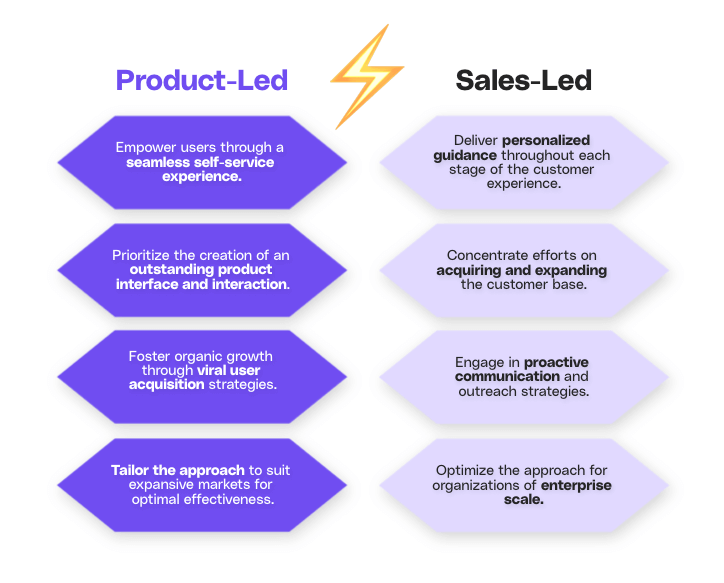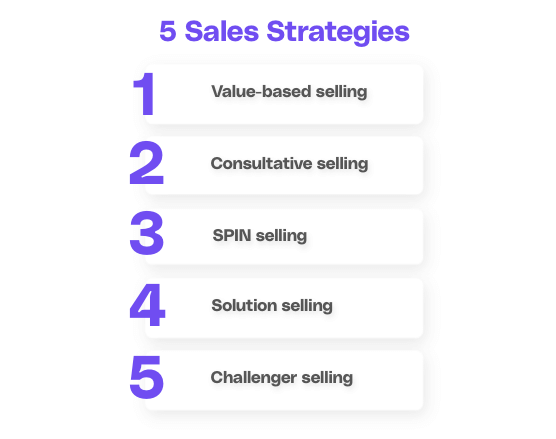Sales-led growth is a crucial concept in business that involves leveraging sales strategies to drive overall growth and profitability. It focuses on prioritizing the sales process to generate revenue and build strong customer relationships. Understanding the concept of sales-led growth is essential for businesses aiming to achieve sustainable success in today's competitive market.
| Key Element | Description | Tips for Implementation |
|---|---|---|
| Understanding Sales-Led Growth | Focuses on leveraging sales strategies for overall growth and profitability. | Align all aspects of the business towards driving sales, prioritize customer relationships. |
| Definition of Sales-Led Growth | Sales activities play a pivotal role in driving overall business growth. | Integrate sales into every aspect, emphasize data-driven decision-making for sustainable growth. |
| Importance in Business | Enables effective customer connection, understanding needs, and providing tailored solutions. | Foster a culture of accountability, set clear targets, and provide ongoing training for a performance-driven environment. |
| Key Principles | Focus on customer needs, building a strong sales team, and implementing effective sales strategies. | Invest in research, create a culture of continuous learning, and utilize data analytics for personalized sales approaches. |
| Benefits of Sales-Led Growth | Increased revenue, enhanced customer relationships, and a competitive advantage. | Drive higher sales volumes, build trust for repeat business, and differentiate from competitors. |
| Challenges in Implementation | Identifying effective sales tactics, training a skilled sales team, and managing customer expectations. | Assess target market, invest in ongoing training, and align promises with business capabilities. |
Understanding the concept
In simple terms, sales-led growth revolves around putting sales at the forefront of an organization's growth strategy. It involves aligning all aspects of the business towards driving sales and revenue generation.
Unlike other growth strategies, such as product-led or marketing-led growth, sales-led growth places heavy emphasis on the sales function.
Implementing a sales-led growth strategy requires a deep understanding of the target market, effective sales techniques, and a robust sales team. It involves not only acquiring new customers but also retaining existing ones through exceptional customer service and relationship management.
Sales-led growth is a dynamic approach that requires continuous analysis, adaptation, and innovation to stay ahead in a competitive business landscape.

(Source: Cello)
The definition of sales-led growth
Sales-led growth refers to a business growth model where sales activities play a pivotal role in driving overall business growth. It involves integrating sales strategies into every aspect of the organization, ensuring the sales team holds a central position in business decision-making and strategic planning.
Furthermore, sales-led growth emphasizes the importance of data-driven decision-making and performance tracking. By leveraging analytics and sales metrics, organizations can identify opportunities for improvement, optimize sales processes, and maximize revenue generation.
This data-centric approach enables businesses to make informed decisions that drive sustainable growth and profitability in the long run.
The importance of sales-led growth in business
Sales-led growth is vital for businesses because it enables them to effectively connect with customers, understand their needs, and provide tailored solutions. By putting sales first, organizations can achieve a customer-centric approach, build lasting relationships, and gain a competitive edge in the market.
Moreover, sales-led growth fosters a culture of accountability and performance excellence within the organization. By setting clear sales targets, establishing key performance indicators, and providing ongoing training and support to sales teams, businesses can create a high-performance sales environment that drives success.
This results-driven approach not only boosts sales revenue but also enhances overall business performance and market positioning.
Key principles
Focusing on customer needs
At the core of sales-led growth is the understanding that a successful sales strategy revolves around addressing customer needs. Businesses must invest in research and market analysis to gain insights into customer pain points, preferences, and buying behaviors.
By aligning products or services with customer needs, businesses can effectively tailor their sales approach, increasing the chances of success.
Understanding customer needs goes beyond just identifying what they want; it involves anticipating their future requirements and adapting offerings accordingly. This proactive approach not only builds customer loyalty but also positions the business as a trusted advisor in the eyes of the consumer.
By continuously engaging with customers through surveys, feedback forms, and personalized interactions, businesses can stay ahead of evolving needs and preferences.

Building a strong sales team
A key principle of sales-led growth is to foster a strong and skilled sales team. Hiring and training individuals who possess excellent communication, persuasion, and negotiation skills is crucial.
Sales professionals should have a deep understanding of the business's offerings. They also need the ability to build trust and credibility with customers.
Building a strong sales team also involves creating a culture of continuous learning and development. Providing ongoing training sessions, mentorship programs, and opportunities for skill enhancement can empower sales professionals to stay updated with industry trends and best practices.
Additionally, fostering a collaborative environment where team members can share insights and learn from each other's experiences can further enhance the overall effectiveness of the sales team.

Implementing effective sales strategies
Implementing effective sales strategies is essential for sales-led growth. This involves:
- Creating a structured and well-defined sales process.
- Setting realistic targets.
- Implementing sales metrics to monitor and measure success.
By identifying the most effective sales channels and utilizing tools like customer relationship management (CRM) software, businesses can streamline their sales efforts and maximize their impact.
Furthermore, leveraging data analytics and artificial intelligence can provide valuable insights into customer behavior and preferences. This enables businesses to personalize their sales approach and offer targeted solutions.
By continuously analyzing sales data and refining strategies based on performance metrics, businesses can adapt to market dynamics and stay competitive in an ever-evolving business landscape.

The benefits of sales-led growth
Increased revenue and profitability
One of the primary benefits of sales-led growth is the potential for increased revenue and profitability. By focusing on sales and aligning business strategies accordingly, organizations can drive higher sales volumes, increase average order values, and improve profit margins. This can lead to sustainable growth and financial success.
Enhanced customer relationships
Sales-led growth allows businesses to build and nurture strong customer relationships. By focusing on customer needs and providing personalized solutions, organizations can establish trust, loyalty, and repeat business. Strong customer relationships can also lead to valuable referrals and positive word-of-mouth marketing.
Competitive advantage in the market
Implementing a sales-led growth strategy can give businesses a significant competitive advantage. By putting sales first, organizations can differentiate themselves from competitors and stand out in the market. A well-executed sales strategy can help businesses penetrate new markets, gain market share, and outperform rivals.
Challenges in implementing sales-led growth
Identifying the right sales tactics
One of the challenges in implementing sales-led growth is identifying and selecting the most effective sales tactics. Businesses need to assess their target market, competitive landscape, and resources to determine the sales approaches that will yield the best results. A thorough understanding of customer preferences and market trends is essential in order to make informed decisions.
There are several different sales strategies, all using different tactics:
- Value-based selling: focuses on demonstrating the unique value and benefits of a product or service to the customer, emphasizing how it meets their specific needs and delivers a superior solution.
- Consultative selling: involves building a strong relationship with the customer through open communication and understanding their needs, allowing the salesperson to provide personalized recommendations and solutions.
- SPIN selling: an acronym for Situation, Problem, Implication, and Need-payoff, this is a technique that involves asking strategic questions to uncover a customer's pain points and needs, guiding the sales process.
- Solution selling: emphasizes addressing the customer's complex problems by offering comprehensive solutions tailored to their specific challenges and requirements.
- Challenger selling: involves challenging the customer's preconceptions and pushing them to reevaluate their needs, providing unique insights and positioning the salesperson as a valuable source of expertise in order to drive the sales conversation.
It is essential for businesses to deeply understand their markets, as this will enable them to choose the right strategy and tactics.

Training and developing a sales team
Another challenge lies in training and developing a skilled sales team. Businesses must invest in ongoing training programs and create an environment that encourages continuous learning and improvement.
Providing sales professionals with the necessary tools, resources, and support can help them excel in their roles and contribute to the overall growth of the organization.
Managing customer expectations
Managing customer expectations is crucial in sales-led growth. It is important to align the promises made during the sales process with the capabilities and deliverables of the business. By effectively managing expectations, businesses can foster trust and satisfaction, minimizing the risk of customer dissatisfaction or churn.
In conclusion, sales-led growth is a powerful strategy that enables businesses to drive revenue, build strong customer relationships, and gain a competitive advantage.
By understanding the concept, implementing the principles, and addressing the challenges, organizations can harness the full potential of sales-led growth and achieve sustainable business success.
Unlock the potential of peer-to-peer referrals with Cello
Ready to transform your sales-led growth with the power of peer-to-peer referrals? Cello offers the perfect solution to turn your users into a dynamic growth channel. With minimal development time and a success-based pricing model, you can seamlessly integrate a P2P referral program into your SaaS product. Experience the ease of automated rewards, real-time performance tracking, and compatibility with your existing tools. Join the ranks of companies like tl;dv and witness a significant boost in your conversion rates. Don't miss out on this opportunity to enhance your sales strategy. Book a demo today to see Cello in action and start capitalizing on user-led growth.
Resources
Related Articles

Why Your SaaS Referral Tracking Is Broken (& How to Fix It in 2026)
TL;DR Cookie-based referral tracking loses 25-40% of attributions due to ad-blockers (31.5% ...

Best Referral Program Software with Recurly Integration
The best referral program software for Recurly is Cello, which provides native, server-side ...

Best Referral Program Software with Paddle Integration
The best referral program software for Paddle users is Cello, which provides direct server-side ...

